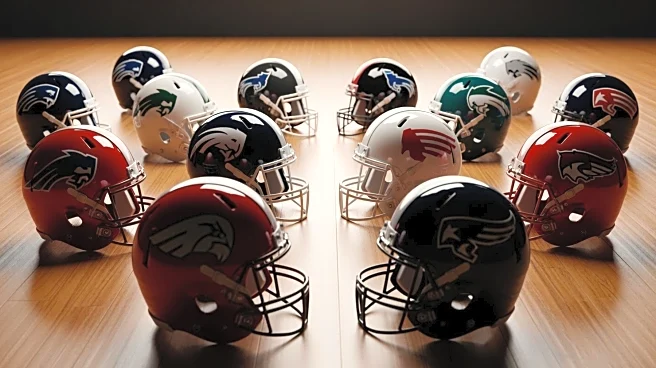What's Happening?
Fantasy football enthusiasts are gearing up for Week 8 of the NFL season with updated rankings from industry experts. These rankings are crucial for players making start/sit decisions in their fantasy
leagues. The rankings cover various positions including quarterbacks, running backs, wide receivers, and tight ends. Notable players such as Patrick Mahomes, Josh Allen, and Jalen Hurts are among the top-ranked quarterbacks, while Jonathan Taylor and Bijan Robinson lead the running back category. Wide receivers like Ja'Marr Chase and CeeDee Lamb are also highlighted for their expected performance. The rankings are based on expert consensus and are designed to help fantasy managers optimize their lineups for the upcoming games.
Why It's Important?
Fantasy football has become a significant aspect of the NFL experience for many fans, offering a way to engage with the sport beyond traditional viewing. Accurate rankings are essential for fantasy managers aiming to maximize their team's performance and compete effectively in their leagues. These rankings can influence decisions that impact the outcome of fantasy matchups, potentially affecting league standings and playoff qualifications. As fantasy football continues to grow in popularity, the demand for reliable expert analysis and rankings increases, underscoring the importance of these updates for participants seeking a competitive edge.
What's Next?
As Week 8 approaches, fantasy managers will be closely monitoring player performances and injury reports to make informed decisions. The rankings will likely be updated as new information becomes available, such as changes in player status or team strategies. Managers may also consider trades or waiver wire pickups to strengthen their rosters based on the latest expert insights. The ongoing analysis and adjustments will be crucial as the season progresses, with each week presenting new challenges and opportunities for fantasy football participants.
Beyond the Headlines
Fantasy football not only enhances fan engagement but also impacts the broader sports industry, including media coverage and advertising. The game's popularity has led to increased viewership and participation, driving revenue for the NFL and related businesses. Additionally, fantasy football fosters community and social interaction among fans, creating a shared experience that extends beyond the games themselves. As technology advances, the integration of data analytics and real-time updates will continue to shape the future of fantasy sports.








